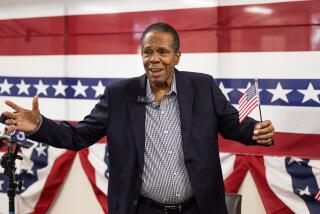An American at Last--With a Little Help : Ceremony: Michael Wu, who has Down’s syndrome, takes citizenship oath with the aid of a congressman and the President.
- Share via
In a moving and tearful ceremony in San Diego Friday, a 26-year-old Taiwanese immigrant with Down’s syndrome took the oath to become a U.S. citizen, aided by a rare private bill signed earlier this week by President Bush.
Surrounded by 124 other new citizens, whose countries of origin ranged from El Salvador to Ethiopia to Poland, Michael Wu led the group in the Pledge of Allegiance as his mother watched the swearing-in of her last child as an American citizen.
Afterward, Wu stood by his mother’s side and talked happily of exploring his next dream--becoming the pilot of a jet plane--”But first,” he said, “we have to go to McDonald’s to celebrate. I wanted to be a citizen more than anything.”
“He loves the Chicken McNuggets,” said his mother, Caroline Wu, 63. “And, I promised him.”
Wu, who, with his family, immigrated from Taiwan in 1980, failed six times to pass a naturalization exam, despite hours of preparation. Wu, fluent in Chinese and English, said he longed to become a citizen, because his parents and two brothers are.
The private bill that made Wu’s citizenship possible was spearheaded by Rep. Bill Lowery (R-San Diego), who said he made “an awful lot of phone calls” and put in “hours and hours” of work after being convinced that no one wanted or deserved citizenship more than Wu.
Lowery presented Wu with the pen used by the President in signing the bill. Wu said afterward that, come November, he will feel privileged in having the chance to vote for Bill Clinton or Ross Perot, “but I will vote for President Bush, because he helped me.”
The bill exempts Wu from the naturalization exam by allowing him to be considered a child under the age of 18 for the purposes of citizenship. Children under 18 can become citizens without taking the exam if their parents are citizens.
At the ceremony, held in the War Memorial Building in Balboa Park with U.S. District Judge John Rhoades presiding, Wu’s teachers said that Down’s syndrome, a congenital disease, causes mental disabilities that make memorization almost impossible.
Answers to questions on U.S. history and politics are required of all immigrants who wish to become citizens. Wu’s mother said he had failed each time in memorizing the names of the 13 colonies and the freedoms guaranteed by the First Amendment.
Wu, who has earned a certificate of completion in the special education program at Mission Beach School, had been taking such tests since 1985, “and he had grown increasingly frustrated,” his mother said. “It had made him sad, but now he is very happy.”
Caroline Wu said her son’s deep desire to become a citizen stemmed from wanting to be “just like his brothers, not to feel that he was different in some way.” Wu said her son will continue to work assembling goods at a facility for the Assn. of Retarded Citizens.
During the ceremony, which honored new citizens from 30 countries--some tall, some short, some young, some old, some adorned in their native dress--speakers extolled the virtues of not taking citizenship for granted, as many born as Americans tend to do.
“We are a young country by the standards of history,” one speaker said, as Wu listened attentively, with an American flag affixed to his left lapel. “Some of us have been here longer than others, most longer than you, but none so long as to obscure the fact that all of our families came here seeking a new way. We are indeed a melting pot of cultures, dreams and realities.”
Lowery, who said the bill was among seven such “private” measures out of 58 proposed in the last session of Congress, credited former Rep. Jim Bates (D-San Diego) with having introduced the legislation, which failed to pass the Senate by the end of the 101st Congress.
Lowery said private bills are “extremely difficult to pass” but added that Wu’s destiny appeared to carry a wish for citizenship that no one could deny.
“The (naturalization) tests proved a bit too difficult for Michael, because he was born with Down’s syndrome,” Lowery said during the ceremony. “His desire and commitment to become a U.S. citizen was demonstrated by the fact that he struggled and cried and struggled.
“Michael’s family, his teachers and all who know him will attest to his desire to learn. His mother has made sure he never missed a day of school. He can speak both Chinese and English, and he’s described as an intelligent printer and a hard worker.
“To me, Michael demonstrates what’s best about Americans--someone who has obstacles to overcome but does his best to succeed with the opportunity given him.”
More to Read
Get the L.A. Times Politics newsletter
Deeply reported insights into legislation, politics and policy from Sacramento, Washington and beyond. In your inbox twice per week.
You may occasionally receive promotional content from the Los Angeles Times.










